The Politics of Faith
Doug Kmiec shocked the conservative political world when he publicly endorsed the presidential aspirations of Senator Barack Obama.
Doug Kmiec shocked the conservative political world when he publicly endorsed the presidential aspirations of Senator Barack Obama. What followed was an intense test of faith and friendship.
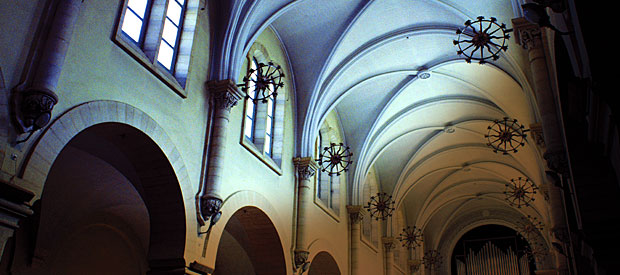

Doug Kmiec
The former constitutional legal counsel to two Republican presidents published the surprise endorsement in Slate magazine on Easter Sunday, 2008. Just three months later, Obama greeted Kmiec in a face-to-face meeting, saying, “I was sorry to learn that you were persecuted for my sake. I will try now especially to merit your confidence.”
Obama was referring to an incident on April 18 when Kmiec, Pepperdine’s Caruso Family Chair in Constitutional Law, was denied communion at a Catholic Mass in Southern California. The lifelong Catholic, near 20-year faculty member at Notre Dame, and former dean of Catholic University was rejected for endorsing Obama, a pro-choice candidate.
The incident was met with public outcry. Some were furious with the Catholic Church and others blamed Kmiec. Last fall Kmiec published the book Can a Catholic Support Him? Asking the Big Question About Barack Obama, in which he offers a thoughtful explanation of why he endorsed the candidate. He also recounts the events of that fateful day—April 18, 2008.
A litany of saints, these splendid women and men of the cloth. Some better teachers than others, but each reaffirming of the faith with insight borne of age, of study, of practical wisdom, of a love of the Scriptures, of a love of God’s Creation. Some more outgoing than others, but each in his own way welcoming, abundantly supplying the unconditional love of the God-man for whom they stand witness.
Until that evening, when all was revoked.
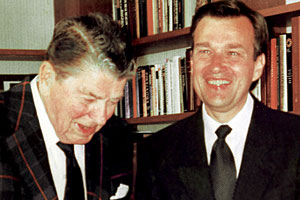
Doug Kmiec with President Ronald Reagan
Suddenly the life-long chain of liturgy was broken into pieces. The priest—the priest who had just joined with us in the prayer of the Rosary was now red-faced, shouting, I thought. Talking about me. I had cooperated with evil. I had? I had killed babies? My heart was black. I was giving scandal to the entire church. I had once been a leader but now I had forfeited any semblance of respectability or leadership. The good father grasped tightly the edges of the ambo, the unusual name given to a lectern in the Catholic Church. No faithful Catholic would ever contemplate doing what I had done. I was dead to the Holy Mother Church.
My wife held my hand tightly. We looked at each other in disbelief. Here was someone in the vestments of the priesthood who had called us to have our prayers be heard, who recited the Kyrie with us, asking the Lord’s mercy upon us, now seemingly merciless, telling me and the many there assembled that I was unworthy. I was to be publicly shunned and humiliated. My offense? Endorsing Senator Barack Obama for President of the United States.
The irony of ironies was that my motivation for the endorsement was entirely Catholic. No, Obama doesn’t share the Catholic faith, but he certainly campaigns like he does. The Senator is focused on the human person, on the common good, on the social justice of economic arrangement. All is so very Catholic.
It was time for Communion. Notwithstanding the indictment of the homily, I did not think of myself as unworthy of receipt of the sacrament—at least no more so than pre-Obama endorsement. Communion in the Catholic tradition is indeed sacred. We believe the bread and the wine is transformed—transubstantiated—into the body and blood of Christ. I have often watched my parish priest focus his gaze with reverence upon the bread and the wine during the offertory to gain some appreciation for the significance of the divine person whose presence one can scarcely grasp.
But I was not to receive the Eucharist that evening. The couples who stood in line before my wife and myself received the body of Christ in their hands or on their tongues and returned to their seats. My wife received. My hand outstretched, the priest shook his head from side to side. Was that a no? It was Judgment Day, and I hadn’t made it. LSAT Insufficient. Inadequate GPA. Do not pass Go . . . go directly to Hell.
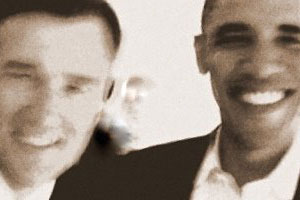
Doug Kmiec with President Barack Obama
Right there I was letting down every priest that had shared the faith tradition with me. I imagined my late mother, who seldom returned home from the factory until well after midnight so that we could afford the tuition at the Catholic school, hanging her head in shame. All the traditions—prayers before meals, May altars and rosaries, novenas and indulgences, the pilgrimages to ten churches on Good Friday—all had somehow been zeroed out. Catholic identity theft, stolen right there by our Lord’s faithful servant, Father _____. I won’t tell you his name because he doesn’t represent the Church’s thinking. Indeed, Cardinal Mahony of Los Angeles, who a month or so later investigated the incident “for the good of the Church,” said it was important to call what happened “shameful and indefensible.”
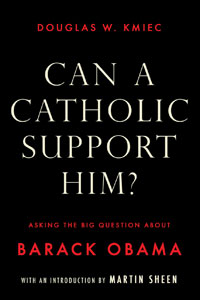 Right there in that moment every Catholic good deed and good thought and good wish
of love of neighbor that I once had seemed inconsequential and insufficient. Like
a child feeling unfairly disciplined, but disciplined nonetheless, I pleaded with
empty hand outstretched: “I think you’re making a mistake, Father.” His red complexion
redder now, betraying righteous anger. His stretched hand over the top of the Ciborium,
the container for the consecrated bread, as if I was going to grab a handful and make
a run for it, and then the pronouncement: “No, you are the one who made the mistake.”
Right there in that moment every Catholic good deed and good thought and good wish
of love of neighbor that I once had seemed inconsequential and insufficient. Like
a child feeling unfairly disciplined, but disciplined nonetheless, I pleaded with
empty hand outstretched: “I think you’re making a mistake, Father.” His red complexion
redder now, betraying righteous anger. His stretched hand over the top of the Ciborium,
the container for the consecrated bread, as if I was going to grab a handful and make
a run for it, and then the pronouncement: “No, you are the one who made the mistake.”
With no further appeal possible and with my wife exiting in confusion, tears, and offended embarrassment, I returned to my place alone. My place? Did I have a place any longer? Was I expected to leave? The double significance of losing the body of Christ—of not having ingested and no longer standing among “the body”—was suddenly all I could think of. Condemned for announcing to the world that I intended to vote for a man whom I thought lived the Beatitudes. A black man; a caring man; a talented man. A man different from my conservative self and yet calling me to find the best of that self. A man who in so many ways asks to care for the least advantaged as he seeks the public responsibility to carry with him, as if it was his own burden, the plight of the marginalized and unemployed worker, the uninsured, the widowed mother grieving over a son lost in Iraq. Their hurts far worse than mine.
It was wrong to be damned; to be excluded from the grace of the sacrament of the Lord Jesus Christ, and all I could think of was the old Tolstoy folk wisdom: “God knows the truth, but waits.”
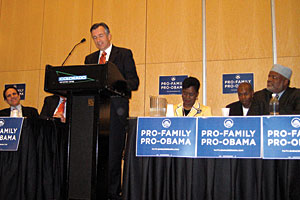 The sad event was kept confidential for a month until a Republican faith-partisan
group—which supports the view that belonging to the Catholic Church categorically
precludes voting for Barack Obama—published information on its Web site. News spread
across the Internet within minutes. “I very much regret that,” says Kmiec, noting
that he has, however, successfully kept the name of the priest and his religious order
out of the public record.
The sad event was kept confidential for a month until a Republican faith-partisan
group—which supports the view that belonging to the Catholic Church categorically
precludes voting for Barack Obama—published information on its Web site. News spread
across the Internet within minutes. “I very much regret that,” says Kmiec, noting
that he has, however, successfully kept the name of the priest and his religious order
out of the public record.
Experts determined that under Canon 915, the denial of Communion was unauthorized and inappropriate. Cardinal Roger Mahoney became involved, and the priest sent Kmiec and his wife a letter of apology. “The letter is thoughtfully written and the apology accepted,” he comments.
In weeks following the incident, Kmiec joined national religious leaders in posing tough faith questions to the future president. Obama then worked to change the Democratic platform to include greater economic support to reduce abortion and to promote adoption, outlined a faith-initiative, and emphasized a father’s responsibility to his family. Kmiec spent his non-teaching hours campaigning in the tough, battleground states of Pennsylvania, Ohio, Michigan, and Indiana.
Kmiec invited those he could not personally reach to join the discussion through his new book, excerpted above. The book sold out in bookstores nationwide and hit #1 in Amazon.com’s religion and politics categories during the campaign. Then Obama won the presidency, sweeping those battleground states and winning an unprecedented 54 percent of the national Catholic vote—in some places, 10 percent more than John Kerry, a Catholic, had mustered in 2004.
Along the way, Kmiec lost friends and suffered from exaggerated and hateful comments in the media. Happily, some new friends came along, like actor Martin Sheen, who agreed to write the foreword to Kmiec’s book. Most importantly, says the professor, was the constant support from his family, the Pepperdine community, his parish, and Monsignor John V. Sheridan at Our Lady of Malibu.
That dark day, however, “will live in my memory until the end times,” says Kmiec. “At every Mass I attend now, I am reminded of the moment when the sacramental door to Communion was slammed in my face. My antagonists say I should be quiet about this. I am playing the martyr, they say. The truth is,” he observes, “there is no need for false histrionics here. If you believe in the sacramental presence, as I do, deprivation, even if only in a single instance, is a long-lasting wound. As in so many things, one must trust in Jesus to believe that he loved me so much that he would give me a glimpse here on earth of how frighteningly terrible it would be to lose him for eternity.”
